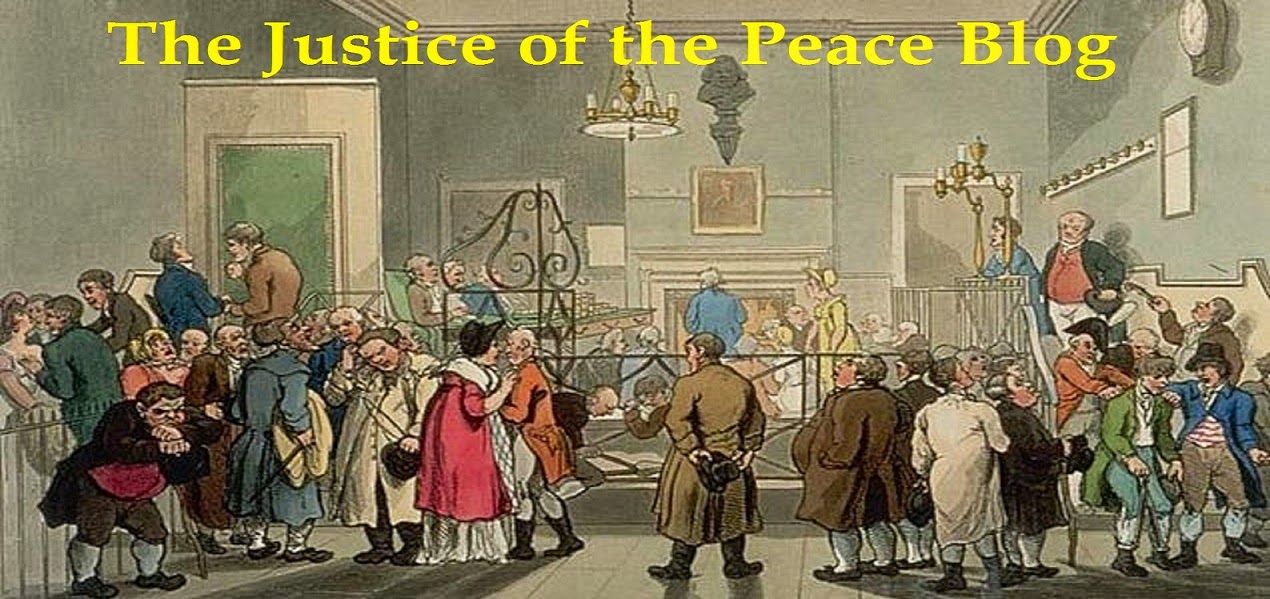It is generally accepted that
magistrates` courts came into being in 1285, during the reign of Edward I, when
‘good and lawful men’ were commissioned to keep the King’s peace. The title
Justice of the Peace (J.P.) first appeared in 1361, in the reign of Edward III.
As the office was unpaid only those with independent wealth could be
appointed. Until the turn of this
century applicants had to declare their political affiliation before their
applications would be considered. Prior to 2003 there was a great deal of truly
local control of individual magistrates` courts.
With major changes in society since 1997;
reduction in crime, increase in out of court disposals, mass immigration,
increases in legislation and government`s increasing desire to exercise
control, units of governance increased
in size eg many smaller London boroughs were abolished and absorbed into larger
entities with populations the size of cities such as Bristol. Courts were no exception to this big is best philosophy. With the formation of Her Majesty`s Courts
and Tribunals Service in 2011 central government has overall control of the
whole courts` process.
On March 25th I sat
for the last time as a magistrate.
I did not resign, I was not removed for misconduct; I have been retired
because I will be about to reach the biblical standard and compulsory
retirement age of three score years and ten.
As an individual who has freely given
one day weekly for each of these seventeen years it will most certainly
leave a gap in my life and lifestyle which will not easily be replaced. But as part of a cohort of baby boomers,
currently 55% of my colleagues are over 60 years old, the lay magistracy is losing its most experienced members many
or most of whom are qualified to sit as chairmen in court. Those in their fifth decade of life make up
28% of J.P.s. The youngest group; the under forties has been fairly constant
over the last decade at under 4% of the total.
An organisation which for whatever reason loses or is projected to lose
such a high percentage of its most senior members cannot be expected to have a
long shelf life. This brief summary is
not about the representative nature of the magistracy. My concern is that as appointees and the most
junior members of the judiciary we are subject to the whim of government. And that whim hints at the removal of lay
magistrates from our courts system as we know it; a
system of courts unique in the world where lay magistrates have powers
of custodial sentencing.
The last fifteen years have seen a gradual
erosion of the powers of magistrates` benches over their members and behind the
scenes court processes. Her Majesty`s
Courts and Tribunal Service has arguably created powers for itself not
envisaged by those who set these changes in motion. Whilst the number of J.P.s has fallen by
almost a third over this period of falling numbers of cases coming to
court the same period has seen the
number of full time District Judges sitting alone rising from below 100 to 139 assisted by 154
part time Deputy District Judges. The
numbers of District Judges (and D.D.J.s)
have increased as a direct result of government policies. It is
reasonable to ask oneself why. It cannot
be purely on cost although if their having a qualified legal clerk for
assistance were abolished the cost difference would be a close run thing
allowing for J.P.s expenses. It cannot
be that increasing court time is required.
The last decade has seen the number of lay magistrates reduced from
c30,000 to c 23,000. The only logical conclusion is that by having the lower
courts under the control of salaried civil servants they become more amenable
to central control. Those more expert
than I in the manipulation of statistics have suggested that converting the
Deputies to full time D.J.s would enable a government to remove the lay Justice
of the Peace from the criminal court altogether replacing him/her with a single
arbiter of law, fact finding and sentencing
thus allowing full - on control of the total courts process by
civil servants beholden to government for their stipend. It is virtually beyond argument that this is
indeed what happened after the riots of 2011.
I personally experienced pressure from senior officials to send where
lawful a related matter at that time to
crown court as District Judges were instructed to do notwithstanding whether or
not it had passed the required seriousness test. My colleagues and I at the time declined such
pressure.
There is no doubt that in their quest to
pursue the concept of restorative justice,
the proliferation of out of court disposals, the pressure to reduce
custodial sentencing and the virtual balancing of costs between J.P.s and an
arguably more efficient and cost
effective professional judiciary there are politicians all too willing to heed
the voices of pressure groups to remove the lay magistracy from the courtrooms
of England and Wales. Recent
legislative changes, many by the coalition, have seen the resignation of a
small number of J.P.s........statistics are impossible to find. Imposition of taxes unrelated to income termed
“victim surcharge” on convicted offenders in addition to costs, fines,
community requirements and custodial sentences were greeted with dismay by most
of my colleagues. Newly announced
additional such taxation known as the Criminal Court Charge will almost
certainly accelerate the philosophical distance between magistrates and
government leading inevitably to
resignations especially from the most senior cohort of J.P.s.
I can now write in all honesty that against my previous expectations I am happy to have reached this milestone; the end of my judicial career. However I intend to continue with this blog as long as I think I have something useful to say and there are some who consider it is something useful to read.


No comments:
Post a Comment